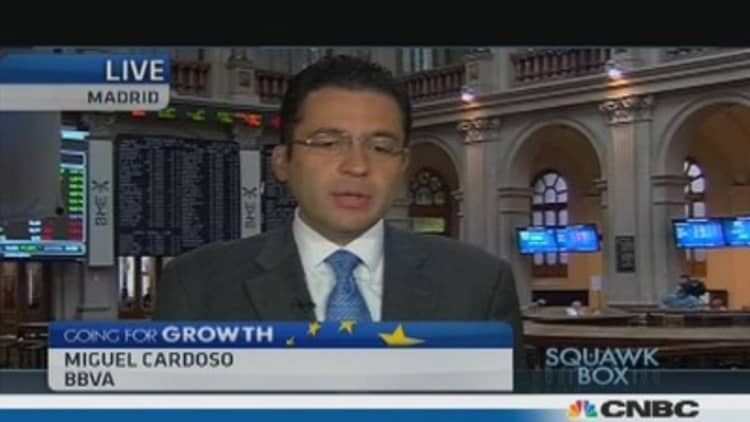Spain's economy emerged from a two-year recession in the third quarter, according to preliminary data released on Wednesday.
Spain's gross domestic product (GDP) grew 0.1 percent in the third quarter, the data released by the country's statistics agency showed, in line with forecasts by analysts polled by Reuters.
It marks a turning point for the economy -- the fourth largest in the euro zone -- which had suffered its eighth consecutive quarter of contraction (of 0.1 percent) in the second quarter of 2013.
Spain's economic crisis was caused by a burst housing bubble. That led to a crash in the banking sector which was weighed down by billions of euros worth of toxic assets.
(Read more: Bankers whisper: Spain's bailout bill could rise)
The government used 41 billion euros ($56 billion) of a 100 billion euro bailout from the euro zone to rescue its banks but resisted a wider sovereign bailout, wary of the strict conditions attached to such aid.

Instead it chose to carry on implementing unpopular austerity measures including cutting public spending and raising taxes. measures which met with widespread public resentment as unemployment hit record highs, particularly among the young where more than half of 15-24 year-olds were without a job.
Last week the Bank of Spain had predicted 0.1 percent growth in the third quarter, a forecast backed up by recent data signaling the country could be returning to growth.
(Read more: Spain's economy contracts again but could reverse trend)
Spain's retail sales rose for the first time in three years in September, according to data released on Tuesday, showing that consumer confidence is slowly returning to the austerity-stung populace.
Furthermore, the jobless rate eased slightly to 25.98 percent in the third quarter from 26.3 percent in the second, official data showed last week.
Despite the latest GDP data, Michael Hewson, chief market analyst at CMC Markets UK, said it was too early to celebrate, however.
"This so-called recovery will likely be heralded by European policymakers as evidence that the fiscal medicine appears to be working, though 26 percent of unemployed workers in Spain might have a different take on that diagnosis," he said in a note on Wednesday.
"Indeed, we've seen EU commissioner Olli Rehn announce yesterday in California that he sees a broad based economic recovery taking place in Europe. He must have extremely good eyesight if he can see a recovery from there, given that Germany is really the only European economy posting any meaningful GDP numbers."
Nicholas Spiro, head of Spiro Sovereign Strategy, agreed that applying the term "recovery" to Spain was inappropriate. "With deflation now setting in, ghastly levels of unemployment, a surge in public indebtedness and the bleak prospect of years of private sector deleveraging ahead, it's very difficult to see how Spain's economy can produce meaningful growth," he told CNBC on Wednesday.
-By CNBC's Holly Ellyatt, follow her on Twitter @HollyEllyatt. Follow us on Twitter: @CNBCWorld


